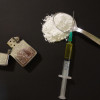Maths and Reading
Interview with
In the news this month was a new study in the journal Nature Communications from Professor Robert Plomin from Kings College London and his colleagues, showing that gene variations linked to reading ability in children are also linked to maths skills. Kat Arney asked him to explain a bit more about the motivation behind the study, and what it might mean.
Robert - What I've been interested in is the extent to which the same genes affect different traits. It might be surprising to listeners to know that diverse cognitive abilities, mental abilities like spatial ability and verbal ability, memory, as well as learning abilities like reading and math are all highly heritable. That means there's a lot of genetic influence. The reason why one person differs from another, the majority of that answer is genetics.
Kat - So, you get it from your mum, your dad.
Robert - Yup, you inherit it in inherited DNA differences in DNA sequence. So, people might be surprised to know, but it's no longer interesting to ask that question - is it heritable - because every single study over decades has shown that it is heritable. So, we're trying to go beyond heritability.
One of the most interesting questions is to ask, are the same genes affecting different traits? Because you might expect something like reading is very different from math because the cognitive processes in doing math and reading would seem to be so different. So, you would expect that although they're both heritable, different genes would affect the two skills.
Kat - So, you've got like a maths gene that means you can add, subtract, juggle numbers in your head, and a reading gene that means you can ocus and understand words.
Robert - Yeah. Most definitely, what's come out of the molecular genetic work on DNA is, it isn't one gene. We're talking about hundreds or maybe thousands of genes of very small effect. So, the question is more quantitative. To what extent are the different genes that affect reading, overlapping with the genes that affect math? The punchline is that although you might expect very different genes to be involved, in fact, most of the genes are the same.
Kat - How did you actually find this out, that the abilities in reading and maths are heritable in this way and that they do seem linked to similar genes?
Robert - The cool thing about this study, it was one of the first to use this totally different method that doesn't use twins or siblings or family members that uses unrelated individuals and genome wide DNA similarities. So, there are these chips that genotype your DNA on something the size of a postage stamp and it gets a million of these DNA markers. So, we can use those million DNA markers to say, "Are you and I a little more similar than me and someone else" than to say, "Are we a little more similar in our reading ability than other people?"
So, instead of identical versus fraternal twins, pair by pair for thousands of pairs, we ask, "Are the people who are genetically more similar at a DNA level - are they more similar on a trait-like reading or on the covariance, the relationship between reading and math?" With 3,000 unrelated individuals in our sample, that gives you nearly 5 million pair by pair comparisons if you see what I mean. So, it's very powerful as well.
Kat - So, you're finding that out of all these people, there are relationships between reading and maths ability and certain parts of the genome, is it possible to say, "Right, it's that gene, it's that gene, it's that gene"? What can this tell us?
Robert - Yeah. Well, that's the big prize. People want to discover these specific genes that account for these heritability. The problem is, throughout the life sciences, biomedical sciences, complex traits like these and common disorders, not rare single-gene disorders, they're influenced by many, many genes of small effect. And so, throughout the life sciences, it's been a major disappointment that although many things are heritable, it's very, very difficult to find the specific genes involved because they each have such small effects.
So we're going to continue trying to find the genes. There's a lot that's still happening. For example right now, the big development is sequencing all 3 billion base pairs of DNA. So, that's what people are doing now. That's the end of the story in terms of DNA sequence variation because you've got all 3 billion base pairs. Not a million DNA markers but 3 billion sequences of DNA. So, that's one direction that things are going.
But I think just at the level we're at now, if there are any parents who still think children are a blob of clay that you just mould to be what you want them to be, tabula rasa, 'the blank slate'. They might pay attention to this data and realise that kids aren't just moulded to be what you want them to be. Maybe as parents and teachers, we need to recognise that children differ even very early in life and maybe respect those differences to a greater extent.
- Previous The Origins of the Moon
- Next Gene of the Month - Pax6









Comments
Add a comment